A Contemporary Look at Organizational Justice by Brockner Joel;

Author:Brockner, Joel; [JOEL BROCKNER]
Language: eng
Format: epub
Publisher: Taylor & Francis Group
Published: 2011-07-11T00:00:00+00:00
Process Fairness, Unfavorable Outcomes, and Affective Forecasting
When outcomes are unfavorable, the relationship between process fairness and how people feel about themselves sometimes takes the form of a â reversal effect â (e. g., Brockner et al., 2008; Holmvall & Bobocel, 2008). Research on affective forecasting suggests that the reversal effect may come as somewhat of a surprise not only to students of organizational justice (e. g., to the advocates of relational theory) but also to the very people who exhibit such a tendency. Implicit in peopleâs tendencies to engage in self-handicapping or to prefer a reduction in process fairness is the strategic nature of such activity. Undergirding both tendencies is the notion that people are able to anticipate how they are likely to feel in response to their future outcomes, and that they are taking steps beforehand to protect themselves if their outcomes prove to be unfavorable and (in the case of self-handicapping) to enhance themselves if their outcomes prove to be favorable.
However, theory and research on affective forecasting have suggested that people often are not good at predicting their future emotional states, including but not limited to their feelings about themselves (Gilbert, 2006). One way in which this predictive shortcoming comes about is through peopleâs inability to anticipate their tendencies to engage in self-protective rationalizations. Whereas people often react to unfavorable outcomes in self-protective ways, they may not be very good at knowing that they will do so prior to the receipt of those outcomes.
In one study (Gilbert, Pinel, Wilson, Blumberg, & Wheatley, 1998), people were asked to predict how happy they would feel if they received an unfavorable outcome as a result of a process that was either fair or unfair. More specifically, participants in a laboratory experiment were told that they would be eligible to receive $ 25 if they successfully completed a job-screening procedure. Half of the participants were told that the screening procedure would be relatively fair, whereas the other half was informed that the screening procedure would be relatively unfair.
All participants were asked to predict how happy they would feel (both immediately and 10 minutes later) if they received the unfavorable outcome of not successfully completing the screening procedure (Gilbert et al., 1998). After their affective forecasts had been assessed, all participants were told that, in fact, they had not passed the screening procedure, and therefore that they would not be receiving the $ 25. They then rated how happy they felt immediately after receiving this bad news and 10 minutes later. Prior to receiving the unfavorable outcome, participants predicted that they would be equally unhappy (both immediately and 10 minutes later), regardless of the fairness of the screening procedure. In other words, participants â predictions of their emotional states appeared to be influenced by the unfavorable outcome itself and not by the fairness of the process through which the outcome was going to be decided.
Once the unfavorable outcome was in hand, however, participants reported feeling significantly happier if the decision process was unfair
Download
This site does not store any files on its server. We only index and link to content provided by other sites. Please contact the content providers to delete copyright contents if any and email us, we'll remove relevant links or contents immediately.
The Brazilian Economy since the Great Financial Crisis of 20072008 by Philip Arestis Carolina Troncoso Baltar & Daniela Magalhães Prates(89387)
International Integration of the Brazilian Economy by Elias C. Grivoyannis(65911)
The Art of Coaching by Elena Aguilar(51755)
Flexible Working by Dale Gemma;(23113)
How to Stop Living Paycheck to Paycheck by Avery Breyer(19439)
The Acquirer's Multiple: How the Billionaire Contrarians of Deep Value Beat the Market by Tobias Carlisle(11970)
Thinking, Fast and Slow by Kahneman Daniel(11488)
The Radium Girls by Kate Moore(11409)
The Art of Thinking Clearly by Rolf Dobelli(9617)
Hit Refresh by Satya Nadella(8694)
The Compound Effect by Darren Hardy(8262)
Atomic Habits: Tiny Changes, Remarkable Results by James Clear(7839)
Tools of Titans by Timothy Ferriss(7581)
Turbulence by E. J. Noyes(7529)
Change Your Questions, Change Your Life by Marilee Adams(7176)
Nudge - Improving Decisions about Health, Wealth, and Happiness by Thaler Sunstein(7050)
How to Be a Bawse: A Guide to Conquering Life by Lilly Singh(7022)
A Court of Wings and Ruin by Sarah J. Maas(6909)
Win Bigly by Scott Adams(6668)
